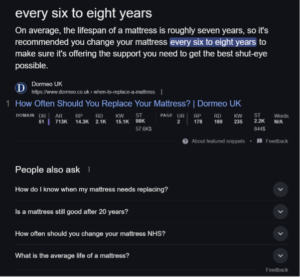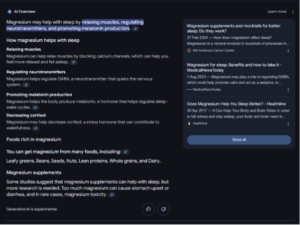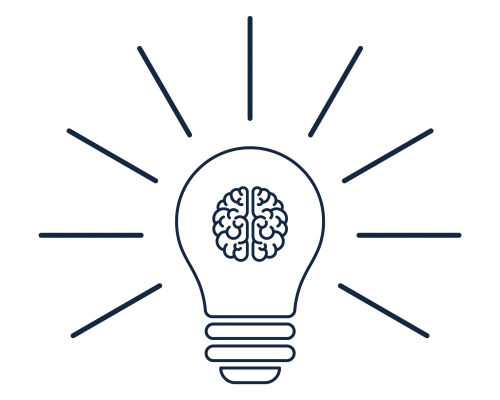Measuring SERP Real Estate in the World of AI
Search Engine Results Pages (SERPs) have always been competitive and continue to evolve, reshaping how organic rankings work. With the rise of featured snippets and AI Overviews, search real estate is shifting, pushing traditional listings, like organic rankings and paid ads, further down.
These SERP features are changing how we access information, influencing user behaviour. Just as people trust Google over other sources, users increasingly rely on AI Overviews and featured snippets for quick, convenient answers rather than continuing to browse additional search results.
AI-driven snippets provide direct, instant answers, reducing the need to click through to external websites and affecting organic rankings. This study explores how AI Overviews reshape SERPs, how SEOs can measure and adapt to these changes, and how organic results are impacted across different keyword types—informational, commercial, and transactional.
How AI Overviews Reshape SERP Real Estate
What is an AI overview?

According to Ahrefs, “Informational intent keywords trigger an AI Overview 99.2% of the time, while AI Overviews only have a 10% chance of appearing for commercial and transactional keywords.”.
SEMrush states that informational intent comes from “80% of desktop and 76% of mobile AIO targeted informational keywords”.
For years, websites competed for SERP visibility by ranking high in organic results, securing featured snippets, and appearing in knowledge panels. However, AI-powered search features are now transforming the SERP.
Metaphorically, AI Overviews are the new luxury apartments of the SERP. They occupy prime real estate, offering visibility and credibility, making them highly desirable for brands. However, the dominance reduces the space for traditional organic listings, pushing them further down the page. This shift can negatively impact website traffic, brand awareness, and authority—especially for businesses relying on organic search for discovery.
For example, when a user searches, “How often should you replace your mattress?” AI Overviews now provide a direct, summarised answer—often eliminating the need to click on any links. This shift is particularly significant for informational searches, as users can find answers directly on the SERP without leaving the page.

The SERP for this query also includes other features, such as a featured snippet and People Also Ask (PAA). These elements further reduce the likelihood of users scrolling down, as they provide multiple ways to confirm the answer directly on the results page. This limits visibility for traditional organic listings, making it even more challenging to attract clicks.

Investigating AI Real Estate: Key Metrics & Measurement Methods
AI Overviews are reshaping SERP real estate, taking prime positions that organic listings once occupied. SEOs must track key metrics to measure this shift:
Click Distribution: CTR reveals whether AI Overviews are absorbing traffic, much like a luxury complex attracting residents away from local businesses.
Above-the-Fold Visibility: AI Overviews push organic results down like skyscrapers blocking older buildings. Measuring how often organic listings remain visible before scrolling highlights this impact.
Query Type Impact: AI dominates informational searches (e.g., “What is magnesium?”), while transactional queries (e.g., “Buy ottoman bed”) still rely on organic results—much like residential vs. commercial districts in a city. With AI Overviews consuming more space, organic results are often pushed below the fold, reducing their visibility. Measuring how frequently organic listings appear before scrolling can highlight this shift.
How AI Overviews Have Reshaped SERP Real Estate
AI Overviews have reshaped the SERP, displacing traditional organic results and SERP features:
- Prime Location Takeover: AI Overviews now dominate, pushing organic results further down, like luxury apartments replacing smaller businesses.
- Reduced Click-Throughs: With AI providing direct answers, users rely less on organic links, like the decline in high street shopping due to people moving to shop online.
- Content: AI pulls from multiple sources rather than featuring a single site—comparable to websites like multi-brand stores like ASOS instead of standalone stores like Nike.
- Displacement of SERP Features: Featured snippets, People Also Ask (PAA), and organic listings are being overshadowed, much like new builds over traditional houses.
- Shifting User Behaviour: Users are making more refined, follow-up searches, just as those living in the city adapt to new conveniences rather than exploring old neighbourhoods.
SEOs can refine strategies to stay visible in an AI-driven search environment by tracking these SERP real estate shifts.
Informational Keywords VS AI Overviews
In this study, we’ll analyse how AI features affect the visibility and performance of informational keywords, comparing how these keywords perform in the presence of AI summaries versus traditional search results. Can AI overviews replace traditional listings for informational queries, and what does this mean for you?
The Experiment
Step 1: Selecting Informational Keyword Queries:
We selected four high-intent informational queries based on AHREFS, which users typically search when they are looking for answers, education, or general information. These queries represent the “prime real estate” for informational content on the SERP:
- “How does magnesium help with sleep?”
- “How much sleep do I need?”
- “What is a hybrid mattress made of?”
- “How to clean an ottoman bed”
These queries were chosen because they represent common informational searches where the user is not necessarily looking to make a purchase but rather to learn or gain knowledge.
Step 2: Analysing SERP Layout
We analysed the SERP for each query to evaluate space distribution between AI-driven features and organic listings. Specifically, we examined:
- Traditional Organic Results: These are the content-rich, authoritative listings businesses or educational sites have created, offering answers or in-depth articles.
- AI-Powered Features: We identified the presence of AI-driven overviews, snippets, or featured answers, which often take the prime real estate at the top of the page.
Step 3: Evaluation Criteria
We assessed the impact of AI-driven features using the following criteria:
- Real Estate Occupancy (3 points): How much space does the AI feature occupy at the top of the SERP, displacing traditional organic results?
- Impact on Organic Visibility (2 points): How significantly are organic results pushed down or altered in visibility due to AI features?
- User Experience (3 points): How does the presence of AI summaries or overviews affect the user’s ability to engage with organic content and find more detailed answers?
Results & Analysis
Here’s how AI-driven features are affecting the visibility of informational queries in the SERPs:
| Keyword | AI Real Estate Impact | Organic Listing Visibility | UX | Total Impact Score |
| How does magnesium help with sleep? | Low AI overview | Organic listings are still visible with P1, a featured snippet | 2 | Medium |
| How much sleep do I need? | Strong AI summary | Organic listings are hidden once the overview opens in full | 3 | High |
| What is a hybrid mattress made of? | Moderate AI snippet | Organic listings are still visible | 2 | Medium |
| How to clean an ottoman bed | Strong AI snippet | Very long AIO, organic listings highly dropped | 3 | High |
Key Insights
- High Impact: Informational keywords like “How much sleep do I need?” are significantly affected by AI-driven overviews, with these features dominating the top of the page and pushing organic results further down. Brands focusing on such keywords may see reduced visibility and engagement, as the AI feature often provides a succinct answer directly on the SERP.

- Medium Impact: For queries like “How does magnesium help with sleep?” AI overviews and summaries only have a moderate impact. While traditional listings remain visible, they are displaced slightly as users are likely drawn to the AI-generated content at the top.

- Low Impact: For keywords such as “how to clean an ottoman bed,” the presence of AI features has minimal effect on organic visibility, indicating that informational queries with specific, step-by-step content still allow traditional listings to maintain a strong presence.
Transactional Keywords VS AI Overviews
The same experiment was conducted on transactional keywords and how other SERP features affect organic rankings.
| Keyword | AI Real Estate Impact | Organic Listing Visibility | UX | Total Impact Score |
| Hybrid Mattresses | No AI overview, but Google Shopping and People Also Ask (PAA) | Organic listings are not visible | 2 | High |
| Upholstered Beds | No AI overview, but Google Shopping | Organic still visible | 1 | Low |
| Purple headboards double | Strong SERPs, no AIO, has a ‘product sites’ and Google shopping | Organic listings are lost within various SERP features | 3 | High |
| kingsize ottoman bed | No AIO but only Google shopping | Organic listings are visible | 1 | Low |

AI Overviews Desktop vs Mobile Real Estate
AI Overviews (AIO) drastically impact SERPs, pushing organic listings further down. But how does this effect change on mobile? We compare two informational and transactional keywords to see where AIO has the least and most impact and how it affects user experience.
Informational Keyword: “How to Clean an Ottoman Bed”
- Desktop: AIO appears at the top, followed by a featured snippet and various SERP features. Organic listings remain visible but lower on the page.
- Mobile: AIO dominates Page 1 when fully expanded, pushing organic results even further down. With featured snippets and other SERP features following, organic listings can easily get lost in the results.

Transactional Keyword: “Hybrid Mattresses”
- Desktop: Google Shopping results dominate, followed by organic listings.
- Mobile: No Google Shopping results appear, allowing an organic listing to be P1, followed by a PAA box (People Also Ask). This shows that Google may prioritise different SERP features on mobile vs desktop.
Low-Impact Informational Keyword: How does magnesium help with sleep?
- Without expanding AIO, an organic listing appears prominently.
- When AIO is expanded, a detailed AI summary replaces much of the visible SERP, limiting user interaction with organic results
Low-Impact Transactional Keyword: “Upholstered Beds”
- SERP presents ‘Popular Products’, showing that Google prioritises product-driven features for transactional searches.
Key Insight:
- On mobile, expanded AIOs dominate the SERP, significantly reducing organic visibility.
- Transactional searches may see different mobile vs. desktop SERP features, affecting how businesses approach SEO and PPC strategies, such as ‘popular products’.
Mobile users experience a much more substantial AIO impact, as the AI overview takes up most of the screen, limiting their ability to view organic results and affecting their overall user experience by potentially decreasing scrolling behaviour and click-through rates. Businesses need to adapt to these changes, especially for mobile traffic.
How to Adapt to SEO Strategies Based on AI Real Estate Data
As AI-driven overviews and snippets evolve, they’re increasingly taking up valuable “real estate” on SERPs for informational queries, significantly impacting the visibility of traditional organic listings. This trend is especially notable for high-interest, broad informational keywords. To stay competitive, brands must adapt by optimising for organic search and AI-powered features.
Here are key strategies businesses can use:
- Optimise for AI Features
Focus on structured data, featured snippets, and E-E-A-T signals to increase the chances of being featured in AI-driven content. - Focus on Transactional Keywords
While AI dominates informational queries, transactional searches still provide opportunities for organic visibility. Businesses should continue optimising product pages and commercial content for transactional intent. - Diversify SEO Beyond Google
With AI increasingly dominating Google, businesses should explore alternative search engines (like Bing) and other content platforms (such as YouTube and social media) to diversify their traffic sources.
The Future of SERP Real Estate
AI Overviews are reshaping SERP real estate, particularly for informational queries. While transactional searches still offer opportunities for organic listings, the growing prominence of AI features means SEOs must stay ahead by tracking key metrics, adjusting strategies, and diversifying their presence. The future will likely see even more space occupied by AI-generated answers, so businesses that adapt to this new landscape will be best positioned to thrive.
P.S. Here are 5 things you may like:
- Get a free audit of your marketing strategy. >>Click here to get your free audit<<
- We’re credited with the best large search campaign of 2023 >>Click here to read the case study of our work with dreams <<
- What does the future of search look like? >>The Future of SEO and Search<<
- AI Search Thought piece >>How Google’s Search Generative Experience (SGE) Impacts Featured Snippets <<
- AI vs Google: Which Platform Gives the Best Product Advice? >>Learn More Here<<
